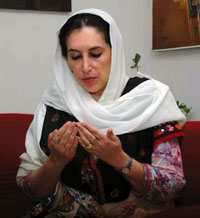|
|
In the summer of 1994, I got a call from the Home Ministry in Kathmandu. Prime Minister Benazir Bhutto, who was on an official visit to Nepal, wanted to visit Dharmashringa Vipassana Center in Kathmandu.
Teachers and trustees of the meditation centre were excited and gathered in the morning awaiting her arrival. We had made arrangements to show her around and explain the Vipassana meditation technique in the tradition of Sayagi U Ba Khin as taught by S. N. Goenka.
Unfortunately, the visit was cancelled. The night before someone had mistakenly told her that the meditation center was a half-hour walk after a 45-minute drive. She did not have that much time and put off the visit. Actually, the centre can be reached in 30 minutes.
Two years later, the Foreign Ministry contacted us again. Prime Minister Sher Bahadur Deuba was going to Pakistan and there was a specific request from Benazir Bhutto to bring along a Vipassana teacher.
Our Principal Teacher Acharya Goenkaji asked me and Nani Maiya Manandhar, both senior teachers, to go with the delegation. Benazir Bhutto was busy with the state visit and sent word that she would meet us as soon as she was free. On the last day of the state visit, the Nepali delegates were returning to Karachi in the afternoon to fly back to Kathmandu. Nani Maiyaji and I were finally summoned at 3PM, after the rest of the delegation had flown off.
Benazir Bhutto had heard much about Vipassana and wanted to learn the technique there and then. We told her it required a 10-day retreat. She did not have such time, and insisted to be taught right away. Acharya Goenkaji had foreseen such a response and had given permission to teach her the Anapana technique. So, Nani Maiyaji taught her Anapana. Benazir Bhutto started practising right away and found it very calming. She said that she had not slept for days and after the session of Anapana, she wanted to take a nap because she felt so tranquil.
We waited while she had a restful sleep. After a few hours, she emerged looking refreshed and happy. We explained to her the salient aspects of Vipassana: a means out of human suffering and misery; not a ritual of an organized religion but an art of living. Vipassana involves no conversion from one religion to another and is open to all without any barrier of caste, creed or gender. The technique helps people control unruly minds and cleanse them of impurities like fear, anger, hatred, ill will, animosity, greed, passion and restlessness. Vipassana teaches how to diminish the ego and to find truth about oneself and to achieve inner peace.
We talked a bit more about Vipassana and where she could possibly sit through a full 10-day course. We also gave her books, tapes and videos. By this time, it was late in the evening and the last flight from Islamabad to Karachi was about to leave. We rushed to the airport. Upon the prime minister's order, two seats had been kept for us and the plane took off as soon as we boarded it. When we landed at Karachi that night, we learnt that there had been a military coup and Benazir Bhutto had been deposed. We has been the last visitors she met as prime minister.
Last week, as news of her assassination came in, I was filled with sadness, but took solace in the fact that she had learned Anapana, an important part of the Vipassana technique. May she be happy and peaceful in her heavenly abode.
Roop Jyoti helps run Vipassana Centers in Nepal and is ex-minister of state for finance.




